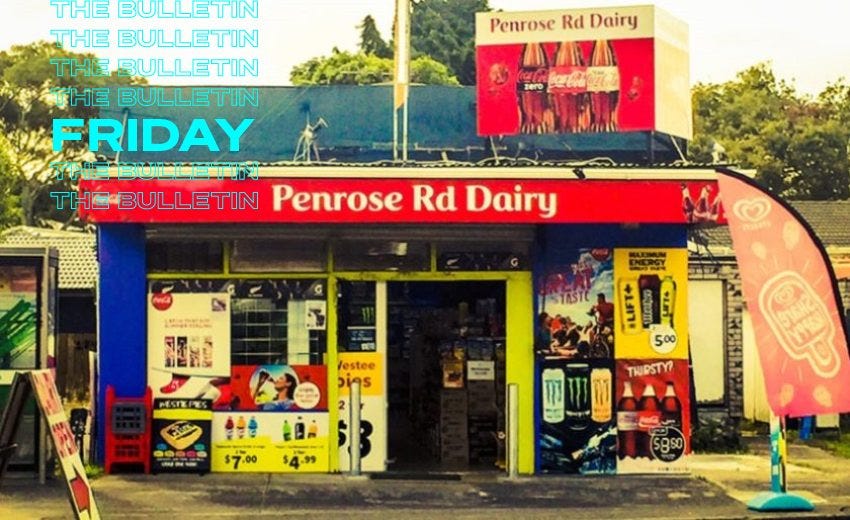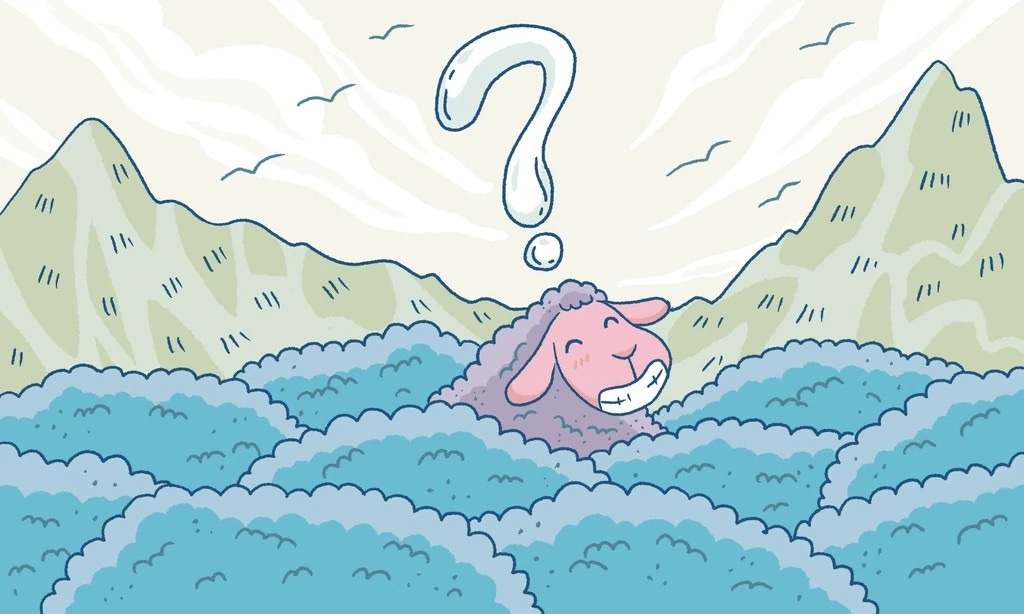The increasingly perilous business of owning a dairy
Dairies are part of the fabric of New Zealand, but as a community reels following a tragic and fatal stabbing, and challenges mount, some owners are looking to get out of the business altogether
Mōrena and welcome to The Bulletin for Friday, November 25, by Anna Rawhiti-Connell. Presented in partnership with Z Energy.
In today’s edition: Three Waters to pass before Christmas; prime minister called on to use Terror Suppression Act powers; how to make a rapidly expanding region affordable for locals again; but first, safety concerns and a changing business and regulatory landscape have dairy owners wondering if it’s worth it
The local dairy is part of the fabric of many communities
The ubiquity of the dairy and its place in local communities
The term “dairy” to describe a small owner-operated convenience store is unique to New Zealand. Travel overseas and you’ll be looked at very strangely when you ask where “a dairy” is. I’ve got three within 500 metres of my home and I am loyal to one because of the banter, which felt especially important during lockdowns. They are a part of the fabric of many communities, something that’s really evident in the photos of people gathered outside the Rose Cottage dairy in Sandringham yesterday following the tragic and fatal stabbing of a 34-year-old man working there. The Herald’s Kim Knight has a moving and raw account (paywalled) from that gathering.
Police minister asks for “please explain” on fog cannons
Police minister Chris Hipkins is calling for calm as emotions run high. Hipkins also wants an explanation from police why the Rose Cottage dairy was not given support from a government initiative to equip businesses with fog cannons to prevent robberies. Hipkins said last night on RNZ’s Checkpoint that on the face of it the dairy should have qualified for fog canon funding. The local neighbourhood support group says they made more than one attempt to get more security at the shop but the police refused their request.
Over-supply of convenience stores and insurance costs
Speaking to several dairy owners in Christchurch yesterday, the Herald’s Nathan Morton found one who is going to shut up shop and move back to India, regardless of whether he is able to sell his business. Others want to get out of the business but are restrained by lease arrangements. Safety remains the number one concern of those Morton spoke to but Christchurch also has an over-supply of convenience stores. “The market is pretty tough right now. If you put one up for sale, [the advertisement] sits there for quite a while before anybody ever shows interest. It’s so hard to find a buyer,” said one owner. About 30 small retail businesses in Hamilton don’t have any insurance cover anymore after multiple crime-related claims have pushed premiums and excesses up.
Smokefree bill will radically alter business model of dairies
Dairy owners spoken to by Morton also cited the uncertainty around the impact of the Smokefree Environments and Regulated Products (Smoked Tobacco) Amendment Bill. That’s due back from select committee next week. The bill will ban young people from ever being able to purchase tobacco in their lives, reduce the levels of nicotine in tobacco products to very low levels, and reduce the number of places that can sell tobacco products. I’m not sure there’s a lot of disagreement about the net social, economic and health benefits of what’s been praised as world-leading legislation, but when it was announced last December, it was made clear that dairies would need to diversify.
How big is the footprint of local beef and lamb?
Commissioned by Beef + Lamb NZ and the Meat Industry Association, a new life cycle assessment report by AgResearch takes a deep look at the emissions produced by the sector. Unlike previous research, which has generally accounted only for on-farm emissions, the new study takes into account everything from processing to transport – and reveals that New Zealand’s beef and lamb producers rank among the world’s most efficient. Liam Ratana took a close look at the report, speaking to AgResearch scientists about what it means for the sector now – and how it could inform its future.
Read the full story now on The Spinoff (sponsored)
Three Waters through by Christmas
As Newsroom’s Jo Moir writes, any speculation that the government might back away from Three Waters has been quashed by the Leader of the House, Chris Hipkins. Hipkins has confirmed he is confident all stages of the bill will pass before Christmas. The third and final reading of the Water Services bill is not happening under this week’s urgency sitting but will happen in December before parliament wraps up for the year. The last sitting day this year is December 15. Moir notes the government is using the “ripping-off the band aid approach”, likening it to John Key pushing ahead with the selling off of parts of State Owned Enterprises in 2013, despite a public poll showing deep opposition.
Prime minister called on to use Terror Suppression Act powers
The National party, the Greens, Act and Te Pāti Māori have written to Jacinda Ardern, asking her to designate Iran's Islamic Revolutionary Guard Corps (IRGC) a terror entity. The IRGC is the military force tasked with defending Iran's Islamic system and has been violently cracking down on protesters following the death of Mahsa Amini in September. Formed in 1979 following the Islamic Revolution, they are considered to be the biggest obstacle to regime change in the country. The UN’s human rights council has just voted to set up a fact-finding investigation into human rights abuses in Iran.
How to share your capital gains
While billionaires build their bunkers in Queenstown, Julie Scott, CEO of the Community Housing Trust is building affordable homes with profits made by new suburb developers. In the latest episode of When the Facts Change, she tells Bernard Hickey all about how inclusionary rezoning can be used to make the rapidly expanding region affordable for locals again.
Click and collect
The prime minister will visit the Chatham Islands today, the first visit from a prime minister in a decade
Advocates call for financial abuse to be made a stand-alone offence
The Herald is reporting an announcement on pay parity for nurses is imminent
Half of New Zealand mothers undecided about their children having the HPV vaccine which protects against almost 90% of of cervical cancers
Not clear if residents will have any input into investigation into the Christchurch City Council’s refusal to approve new housing density rules
Got some feedback about The Bulletin, or anything in the news? Get in touch with me at thebulletin@thespinoff.co.nz.
If you liked what you read today, share The Bulletin with friends, family and colleagues.
What did you do during level four lockdown? Claire Murdoch read every single one of Lee Child's Jack Reacher novels from cover to cover, and today she presents her magnum opus: a comprehensive ranking of all 28 books from worst to best. Toby Manhire concludes his 2017 Candidate Diaries trilogy with "effectively annoying" (her words) Green MP Chlöe Swarbrick. Alex Casey asks if dermatology really caters to all shades of skin. Chris Schulz warns some Black Friday deals are too good to be true. And in the most heartwarming read of the week, Sela Jane Hopgood learns to swim.
Landmark case brought against High Performance Sport NZ
As Stuff’s Dana Johannsen writes, a landmark employment case brought against High Performance Sport NZ by a collective of athletes could reshape high performance sport. A newly formed athlete union, led by Mahe Drysdale and Tokyo Olympian Kirstie Klingenberg, is taking the government sport agency to the Employment Relations Authority. It’s a complex issue with roots that date back to 2018. Johannsen unravels it and explains why it is set expose the deep fault lines that exist with the elite sporting system.
It’s Friday so…
People's Daily, a news outlet run by the Chinese state shared an eerie and deeply strange video on Twitter last week of dozens of sheep in China's Inner Mongolia Autonomous Region walking around in tight, almost perfect concentric circles. They’ve apparently been doing it for two weeks. “Sign of the apocalypse,” one person wrote. Agricultural scientists all over the world have stepped up to offer explanations and it seems the answer is probably not to be found in Revelations, but in the theory of flock mentality.











